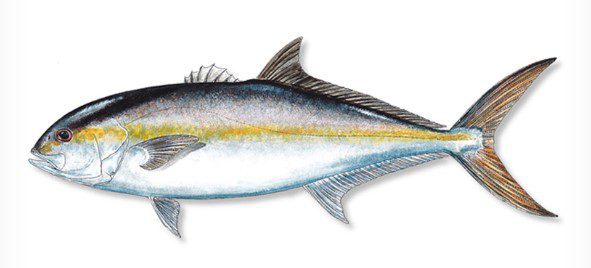

Amberjack is not recommended for dogs due to the health risks associated with this fish. First, this fish is known to accumulate high levels of mercury, and second, it can contain ciguatoxin, which can cause ciguatera fish poisoning in dogs. Additionally, amberjack can also be host to parasites, like tapeworms.
Amberjack is found to contain high levels of mercury, which can be toxic to dogs. In addition, it also contains ciguatoxin, which can cause ciguatera fish poisoning (CFP). Symptoms of CFP in dogs include diarrhea, head shaking, vomiting, and paralysis. Moreover, amberjack can also be a host to parasites, like tapeworms.
Amberjack is a type of saltwater fish generally found in tropical climates, with other more common names including Greater Amberjack, Yellow Kingfish, Gold-Striped Amberjack, and Common Kingfish. Originating in the Indo-Pacific regions, it is mainly used in sashimi and sushi dishes, although its consumption may also be found in some Caribbean and African locations. Amberjack is rich in omega-3 fatty acids, has a good nutrient profile, and is a source of vitamin D, potassium, and phosphorus.
Despite its possible health benefits, amberjack is highly susceptible to mercury and ciguatoxin contamination. It is also a potential host to parasites, so is not generally recommended for dogs to consume. If your pet has shared some amberjack from your plate, and it has been properly prepared, it should be safe. Eating this fish raw is not advised, as the risks to your dog's health are too great.
As an alternative, other fish that are safe and beneficial for your pet include sardines, salmon, trout, and whitefish. All these fish are low in mercury, and contain beneficial vitamins and minerals.
Do all types of fish pose health risks to your dog? Are some types better than others? Generally speaking, wild caught fish will be more nutrient-dense but will also be higher in mercury, while farmed fish will contain less mercury but also have fewer natural nutrients. It is important to weigh up the risks for your pet and to stay mindful of the servings you give them.
Does your pet have any experience with eating amberjack? What types of fish do you involve in your pet’s diet? We’d love to hear about it in the comments.
We hope that your pet has a safe and healthy diet full of delicious treats and meals!